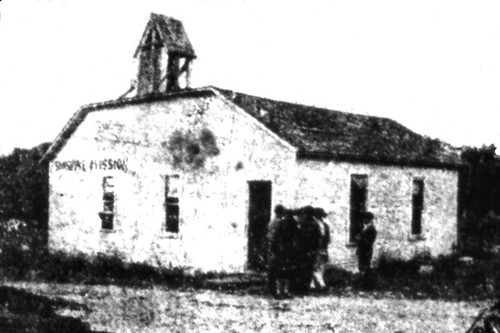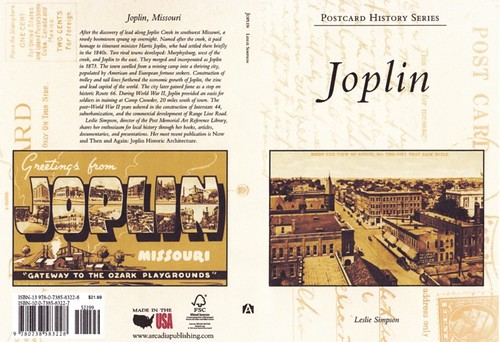Joplin has benefited from the charity of many over the past year since May, 2011. More than a century ago, Galveston, Texas, was virtually wiped out by a hurricane that claimed 6,000 to 12,000 lives. When that city was struck by a natural disaster, Joplin stepped forward in 1900 and offered over $25,000 to the beleaguered city, a sum close to $646,348.57 in 2010 dollars.

Joplin Charity
New Joplin History Book Honors the Past & Helps Rebuild the Future
Leslie Simpson, Director of the Post-Memorial Art Reference Library, has a new book coming out on Joplin history, appropriately titled, Joplin. The book is a history of Joplin as told “in hundreds of vintage images” and will be launched at an event at Hastings on September 24, this Saturday, at 10:00 AM. Profits from the first printing will go exclusively to the Joplin Chamber of Commerce Business Recovery Fund. Once we get a hold of a copy, we’ll be posting a review. Until then, please find the press release below concerning the event below!
New Joplin History Book Honors the Past &
Helps Rebuild the Future
Longtime Joplin resident Leslie Simpson is the author of a new history
book that tells the story of Joplin’s past in hundreds of vintage images.
Joplin, the newest addition in Arcadia Publishing’s Postcard History series,
will be available on Saturday, September 24 exclusively at the Hastings
store in Joplin.
Covering a span of more than 130 years, Joplin traces all aspects of the
city’s history through vintage postcard images. Author Leslie Simpson
describes the book as “My love letter to the city of Joplin!”
Local history publisher Arcadia Publishing and multimedia retailer
Hastings Entertainment, Inc. will donate proceeds from the first printing of
the book to the Joplin Chamber of Commerce Business Recovery Fund.
The CEO’s from both companies have been personally involved in the
project and hope the initiative will support Joplin’s ongoing business
recovery efforts.
“When a tragedy like this happens, no matter how far away it is, your
first instinct is to want to find a way to help,” said Arcadia Publishing
president and CEO Richard Joseph. “I’m glad we could do this,” he
said.
Hastings Entertainment CEO John Marmaduke shared, “We are
pleased to have this book available at a time when locals truly need
something to be excited about.”
Joplin will be exclusively available at Hastings through October 2011.
Non-local residents can order online at www.goHastings.com, from the
publisher at www.arcadiapublishing.com, or by calling (888)-313-2665.
###
About Arcadia Publishing
Arcadia Publishing is the leading publisher of local and regional history in the United States. Books celebrate the
places and faces that give America its spirit and life. Distinctive sepia covers, local authors, and vintage images
present a curbside look and street level understanding of a town’s bygone times. Find your place in history at
www.arcadiapublishing.com.
About Hastings
Founded in 1968, Hastings Entertainment, Inc. is a leading multimedia entertainment retailer that combines the
sale of new and used books, videos, video games and CDs, and trends and consumer electronics merchandise,
with the rental of videos and video games in a superstore format. www.goHastings.com
Book proceeds to benefit Joplin local businesses
Author Leslie Simpson has
lived in Joplin for the past 32
years. She helped establish
Main Street Joplin and the
Joplin Historic Preservation
Commission.
Joplin
Postcard History Series
Price: $21.99
128 pages/ softcover
Available: September 24, 2011
MEDIA INQUIRIES
Arcadia: Mrs. PJ Norlander, Director of Marketing
843.853.2070 x160 pjnorlander@arcadiapublishing.com
EVENT INQUIRIES
Hastings:
Phone: 417-659-9828
Joplin Book Launch Event
Saturday, September 24, 2011
10:00 a.m.
Host
PUBLIC IS WELCOME
Come share your own stories.
Meet the author.
Take a walk back in time.
Who:
Hastings will host the author, Chamber of Commerce members,
community leaders, the publishing company, and any and all residents who
wish to attend.
What:
A special launch event celebrating the publication of a new local history
book, Joplin, by Leslie Simpson.
When:
Saturday, September 24, 2011 from 10:00 a.m. to 12 noon
10:00 a.m.
Welcome, Ribbon Cutting Ceremony,
Chamber of Commerce Ambassadors Presentation
10:30 a.m.
Author Book Signing
Book
Where:
Hastings located at 526 South Range Line Road.
Why:
Proceeds from the sale of the book will be donated to the Joplin Chamber
of Commerce Business Recovery Fund.
Beneficiary
Directions and event information can be found online at
www.arcadiapublishing.com/Joplin.


